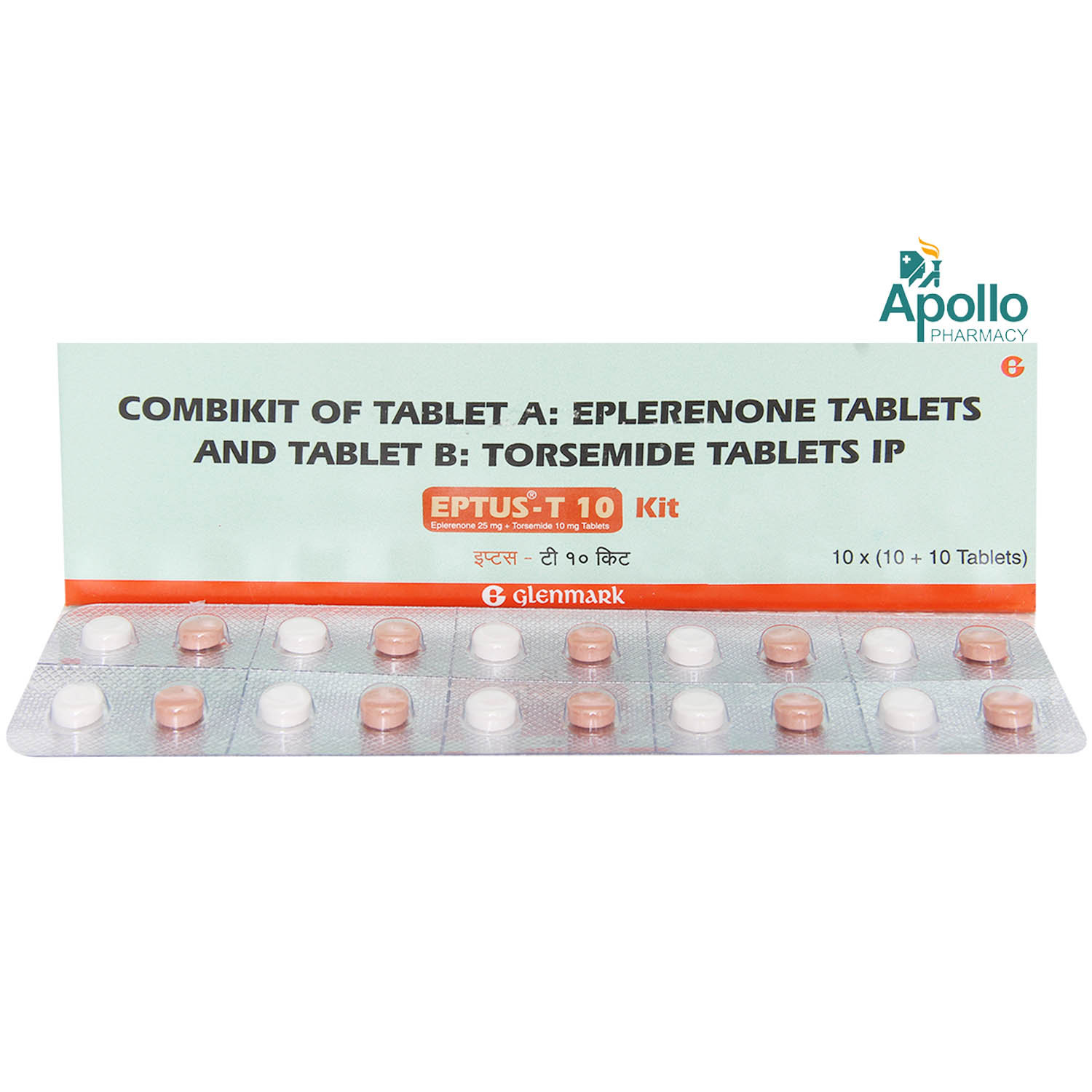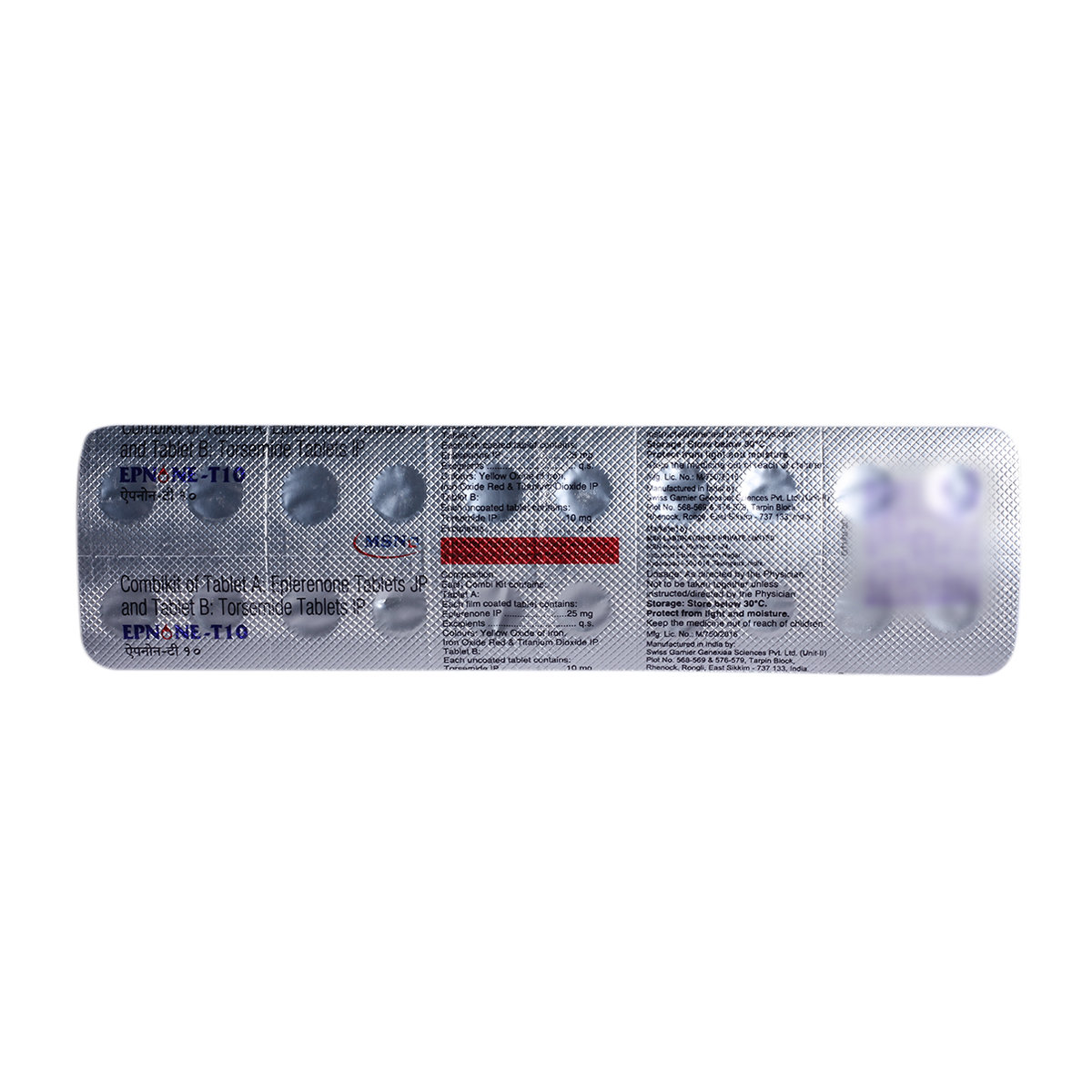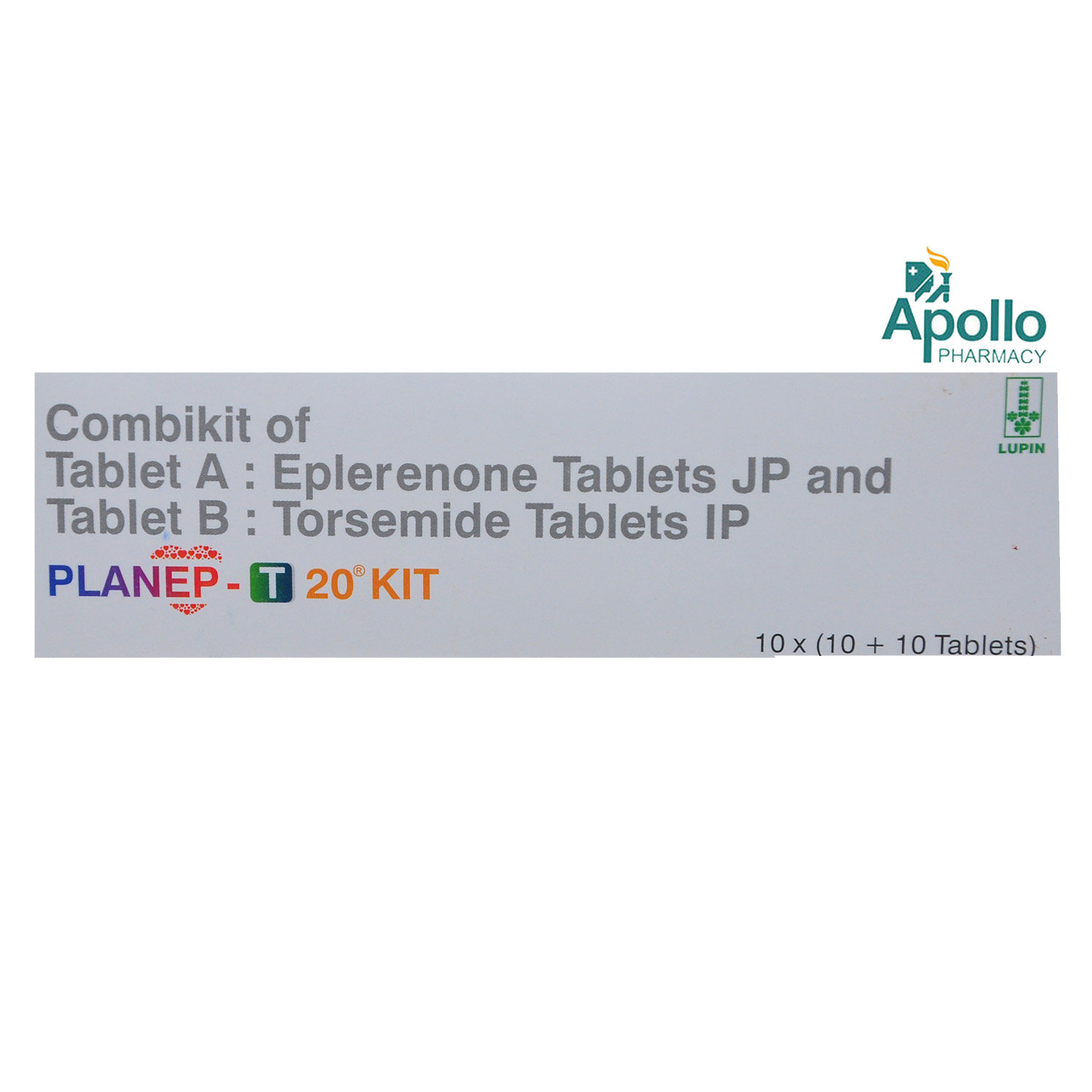Eplerenone+torsemide
About Eplerenone+torsemide
Eplerenone+torsemide is used to treat congestive heart failure post-heart attack. Additionally, it is also used to treat oedema (fluid build-up) and hypertension (high blood pressure). High blood pressure is a condition in which the force of blood against the walls of blood vessels is too high.
Eplerenone+torsemide contains Eplerenone and Torasemide, which work by removing excess water and certain electrolytes from the body. It also helps maintain potassium levels. Thus, Eplerenone+torsemide lowers blood pressure and improves the functioning of the heart.
In some cases, Eplerenone+torsemide may cause side effects like headache, dizziness, diarrhoea, constipation, nausea, and excessive urination. Most of these side effects do not require medical attention and resolve over time. However, consult your doctor if the side effects persist or worsen.
Do not take Eplerenone+torsemide if you are pregnant or breastfeeding. Consult your doctor if you are pregnant or breastfeeding. Keep your doctor informed if you are taking any other medications and about your medical conditions.
Uses of Eplerenone+torsemide
• Treatment of Oedema (Swelling): It helps remove excess fluid from the body, reducing swelling in areas like the legs, feet, and ankles.
• Treatment of Hypertension (High Blood Pressure): It lowers blood pressure by eliminating extra fluid and easing the workload on the heart.
Medicinal Benefits
- Eplerenone+torsemide helps improve survival in patients with congestive heart failure (CHF) following a myocardial infarction (heart attack).
- It aids in the management of hypertension (high blood pressure) by removing excess fluid and relaxing blood vessels.
- It reduces oedema (fluid retention) associated with heart failure, liver cirrhosis, or pulmonary hypertension.
- Eplerenone helps maintain normal potassium levels in the blood while controlling blood pressure.
- Torasemide promotes the removal of excess salt and water from the body, reducing swelling.
- It helps prevent fluid buildup in the lungs and tissues, improving breathing and comfort.
- Eplerenone+torsemide reduces strain on the heart, improving its overall function and efficiency.
- It enhances the quality of life and reduces complications related to fluid overload and high blood pressure.
Directions for Use
- Eplerenone+torsemide can be taken orally with or without food, or as directed by your physician.
- It is best to avoid taking this medication within 4 hours of your bedtime to prevent having to get up to urinate.
- Swallow the tablet whole with a full glass of water.
- Do not crush, chew, or break it.
Storage
Side Effects of Eplerenone+torsemide
- Headache
- Dizziness
- Diarrhoea
- Constipation
- Nausea
- Excessive urination
Drug Warnings
- Do not take Eplerenone+torsemide if you are allergic to any of its components.
- Inform your doctor if you have anuria (lack of urine production), low blood pressure, hepatic coma and precoma, hypovolaemia (low blood volume), diabetes, and heart, kidney or liver problems.
- Consult your doctor if you are pregnant or breastfeeding.
- Eplerenone+torsemide is not recommended for use in children.
- Drive only if you are alert, as Eplerenone+torsemide may cause dizziness and sleepiness.
- Let your doctor know if you are taking any other medicines, including supplements and herbal products.
Drug Interactions
Drug-Drug Interactions: Eplerenone+torsemide may interact with other high blood pressure-lowering pills (metoprolol, ramipril, losartan), blood-thinning medicines (aspirin, warfarin), certain antibiotic medications (gentamicin, gentamycin, cephalexin, ceftriaxone, trimethoprim), immunosuppressants (tacrolimus, ciclosporin), certain medicines used to treat bipolar disorder (lithium), certain medicines used for heart conditions (digoxin), certain NSAID medications (ibuprofen), antifungal medications (itraconazole), and medicines that affect potassium levels (spironolactone, amiloride).
Drug-Food Interactions: No interactions found.
Drug-Disease Interactions: Eplerenone+torsemide may interact with disease conditions, including heart disorders, diabetes and microalbuminuria (persistent elevation of albumin in the urine), hyperkalemia (high potassium), anuria or renal dysfunction, liver disease or cirrhosis, electrolyte losses, ototoxicity (ear Poisoning), and hyperuricemia (elevated uric acid).
Drug-Drug Interactions Checker List:
Safety Advice

Alcohol
cautionAvoid consuming alcohol while on treatment with Eplerenone+torsemide as it may lead to serious side effects.

Pregnancy
cautionInform your doctor if you are pregnant or suspect pregnancy. Your doctor will weigh the benefits and potential risks before prescribing Eplerenone+torsemide.

Breast Feeding
cautionIt is not known if Eplerenone+torsemide passes into breastmilk. So, inform your doctor if you are a nursing mother. Your doctor will weigh the benefits and potential risks before prescribing Eplerenone+torsemide.

Driving
cautionEplerenone+torsemide may cause dizziness and sleepiness. Drive only if you are alert.

Liver
cautionEplerenone+torsemide to be taken with caution, especially if you have a history of liver diseases. Your doctor may adjust the dose depending on your current liver conditions.

Kidney
cautionEplerenone+torsemide to be taken with caution, especially if you have a history of kidney diseases. Your doctor may adjust the dose depending on your current kidney conditions.

Children
unsafeEplerenone+torsemide is not recommended for children below 12 years of age.
Habit Forming
Diet & Lifestyle Advise
- Keep your weight under control with a BMI of 19.5-24.9.
- Regular physical activity or exercise for at least 150 minutes per week, or about 30 minutes most days of the week, can help lower your raised blood pressure by about 5 mm of Hg.
- Opt for a diet rich in whole grains, fruits, veggies, and low-fat dairy products.
- Limit your daily sodium chloride (table salt) intake to 2300 mg per day, or less than 1500 mg, which is ideal for most adults.
- If you take alcohol, only one serving for women and two servings for men is advisable.
- Quitting smoking is the best strategy to lower the risk of heart disease.
- Avoid chronic stress, as it can raise your blood pressure. To cope with stress, try to enjoy and spend time with your loved ones and practice mindfulness techniques.
- Monitor your blood pressure daily and immediately contact your doctor if there is excessive fluctuation.
- Try to include heart-healthy foods and drinks rich in omega-3 fatty acids in your daily diet. You can also use low-fat cooking oils like olive oil, soybean oil, canola oil, and coconut oil to lower your elevated blood pressure.
Special Advise
- Treatment with Eplerenone+torsemide requires regular serum potassium, sodium and creatinine monitoring.
- Monitor your blood pressure daily and immediately contact your doctor if there is excessive fluctuation.
Patients Concern
Disease/Condition Glossary
Heart failure: Heart failure is a condition in which the heart is unable to pump blood as effectively as it should. Conditions such as coronary artery disease, arrhythmia, congenital heart defect, diabetes, overactive/underactive thyroid, or high blood pressure make the heart too weak to pump blood efficiently. Symptoms of heart failure include shortness of breath, rapid heartbeat, swollen legs, and fatigue. People with disease conditions such as diabetes, thyroid problems, anaemia, emphysema, and behavioural conditions like smoking and being overweight are at an increased risk of developing heart failure.
Oedema: Oedema or fluid overload is associated with pulmonary hypertension (high blood pressure in the lungs) or heart failure (irregular pumping of the heart). The main characteristics of oedema are leg swelling, shortness of breath, chest pain (angina), abnormal heart rhythms (arrhythmia) and swelling in other areas of the hands or abdomen.
High blood pressure (hypertension): It is a condition in which the blood exerts increased pressure on the walls of blood vessels, leading to hypertension. This condition can lead to hardened arteries (blood vessels), decreasing the blood and oxygen flow to the heart. Raised blood pressure can cause chest pain (angina) and a heart attack (when the blood supply to the heart is blocked). Additionally, high blood pressure also causes brain damage (stroke) and kidney failure. Symptoms of high blood pressure include headache, dizziness, nose bleed, changes in vision, chest pain, weakness and dyspnoea (shortness of breath). However, most of the time, there are no signs or symptoms of hypertension.
FAQs
Eplerenone+torsemide is used to treat heart failure after a heart attack, high blood pressure, and oedema (fluid build-up).
Eplerenone+torsemide contains Eplerenone and Torasemide. Eplerenone blocks the hormone aldosterone, preventing fluid retention and maintaining potassium levels. Torasemide removes excess water and salt from the body, reducing swelling and fluid overload. Together, they improve heart function, reduce oedema, and help control blood pressure.
The main side effect of Eplerenone+torsemide is peeing (urination) more often than usual. Most people need to pee about 30 minutes after taking Eplerenone+torsemide and again within a few hours. Do not take Eplerenone+torsemide before going to bed, or you may have to wake up in the night to go for urination frequently.
Yes, Eplerenone+torsemide is known to cause dehydration (excessive loss of fluids). The patient may experience dry mouth, decreased urine output, excessive thirst, and hypotension (decreased blood pressure). Please increase fluid intake to avoid excessive dehydration.
Yes, Eplerenone+torsemide can cause increased potassium levels (hyperkalemia), especially in patients with kidney problems or if you are taking potassium supplements along with Eplerenone+torsemide. Please monitor your electrolyte level regularly to avoid increasing blood potassium levels.
Yes, Eplerenone+torsemide may occasionally cause dizziness due to orthostatic hypotension (sudden drop in blood pressure when standing from a lying position) or passing out. To lower the chance of feeling dizzy or passing out, rise slowly if you have been sitting or lying down.
Eplerenone+torsemide may cause side effects like headache, dizziness, diarrhoea, constipation, nausea, and excessive urination. Most of these side effects do not require medical attention and resolve over time. However, consult your doctor if the side effects persist or worsen.
Eplerenone+torsemide may increase creatinine levels by affecting kidney function. Therefore, consult a doctor before taking this medication; it’s important to monitor kidney function regularly while using these medications.
When taking Eplerenone+torsemide, it's essential to follow certain precautions. If you have kidney problems, your doctor may need to adjust your dose. Additionally, monitor your potassium levels, as Eplerenone+torsemide can increase potassium levels in the blood. Inform your doctor about your medications, supplements, and vitamins to avoid potential interactions. Consult your doctor before taking Eplerenone+torsemide if you are pregnant, breastfeeding, or planning to become pregnant. Be sure to follow your doctor's instructions for dosage and attend all scheduled follow-up appointments. Immediately report any signs of hyperkalemia (high potassium levels) or other adverse reactions to your doctor. Your doctor may periodically check your kidney function, blood pressure, and potassium levels while taking Eplerenone+torsemide.
Eplerenone+torsemide should not be used during pregnancy unless absolutely necessary. Therefore, consult a doctor if you are pregnant. Before prescribing this medication, your doctor will carefully assess the benefits and potential risks.
Eplerenone+torsemide may cause constipation as a common side effect. If you experience this symptom, drink plenty of water to stay hydrated, eat a fibre-rich diet, exercise regularly, and limit caffeine intake.
Eplerenone+torsemide should be used with caution in patients with kidney problems. If you have a history of kidney disease, consult your doctor before taking Eplerenone+torsemide. Your doctor may need to adjust your dose depending on your current kidney condition.






